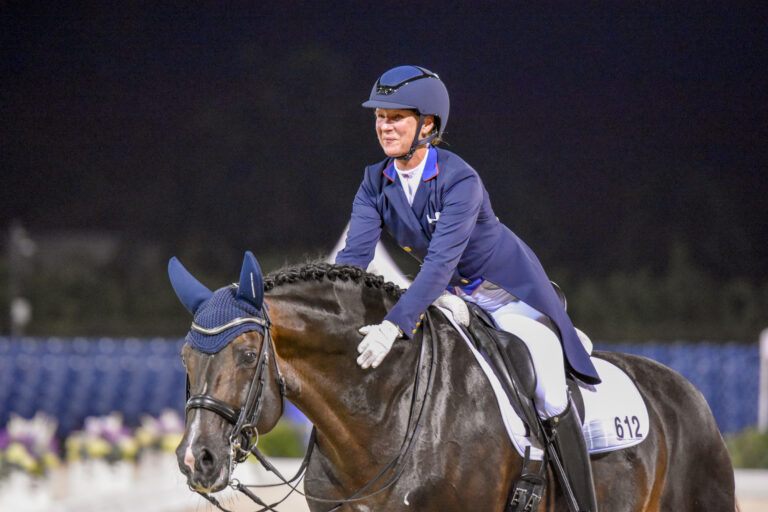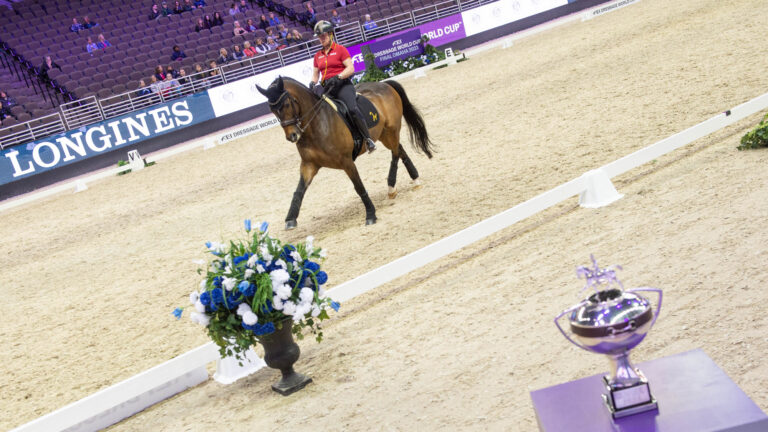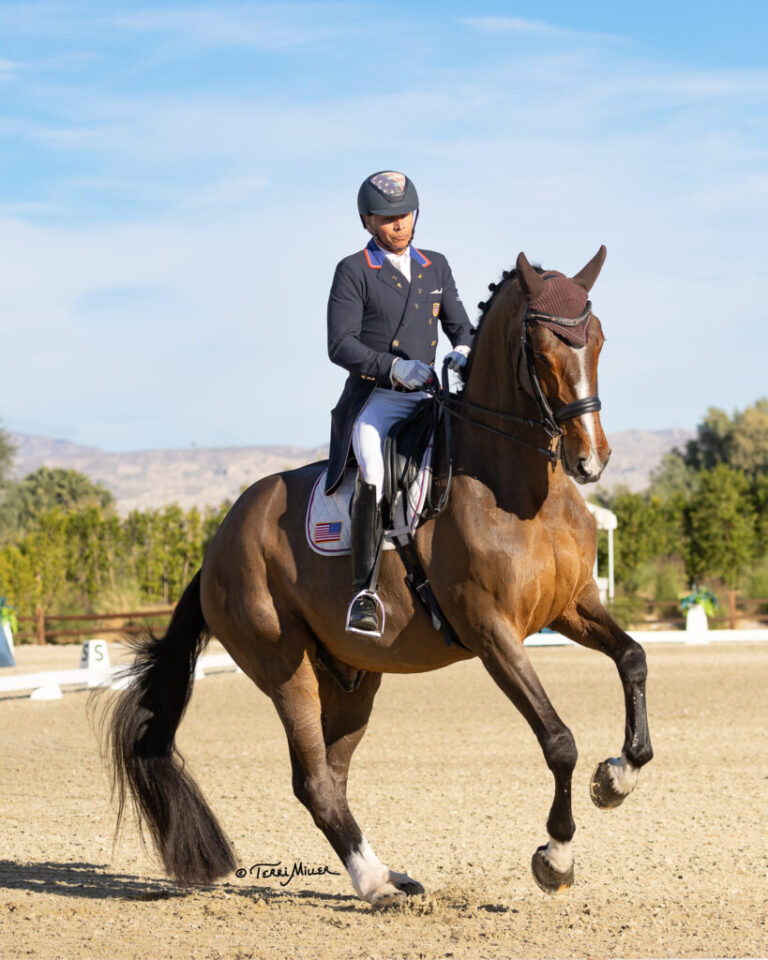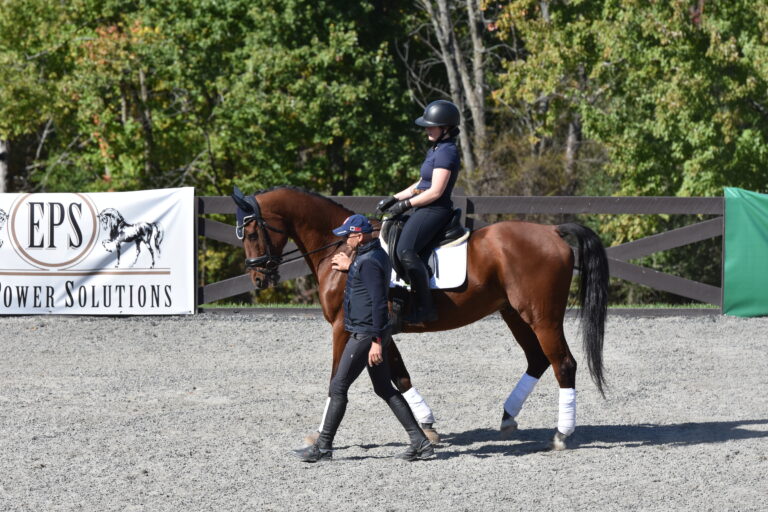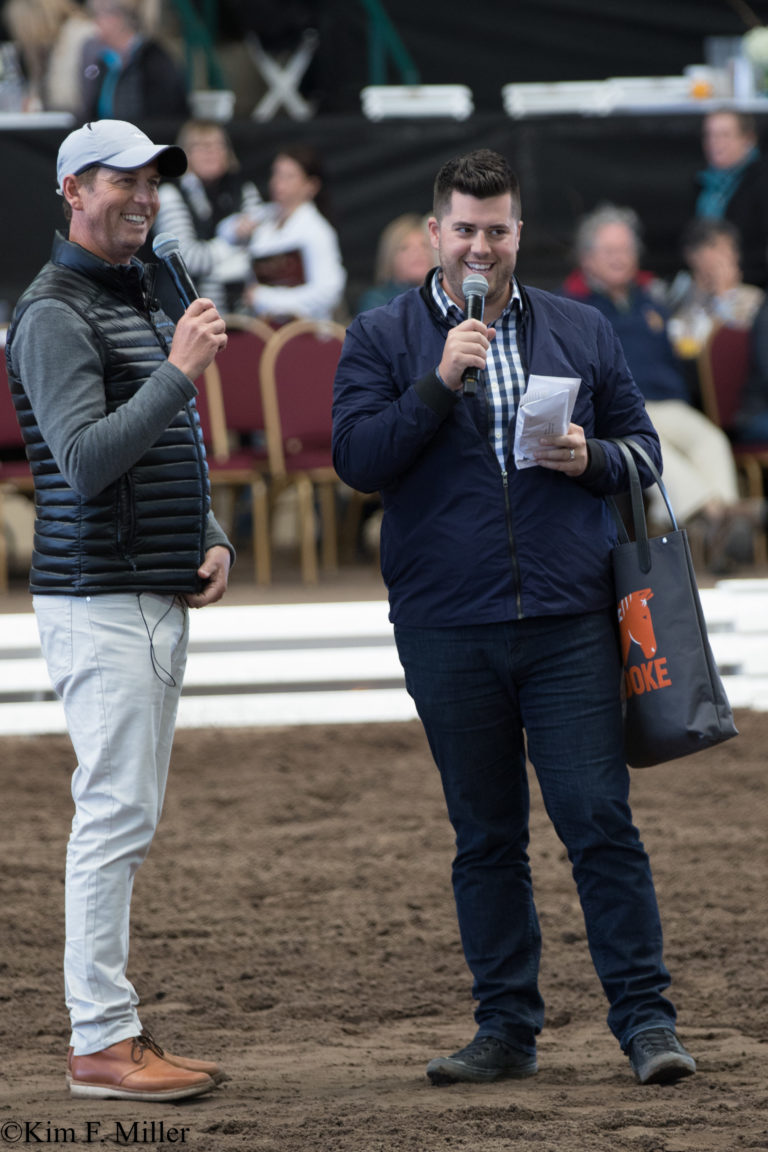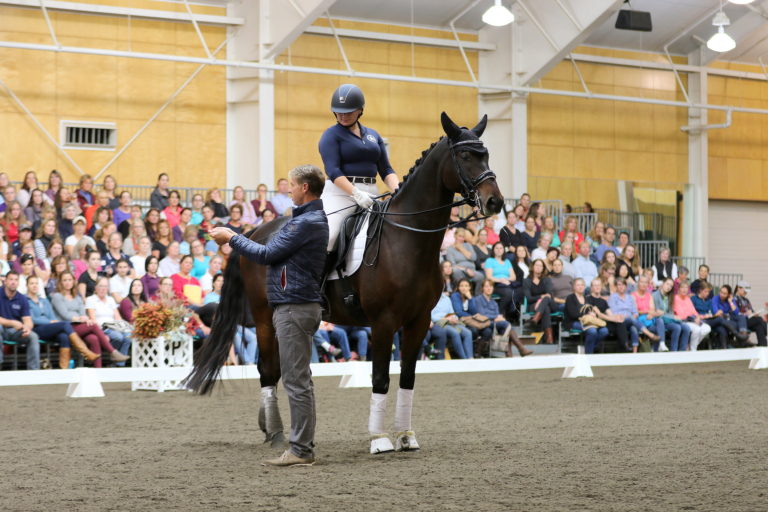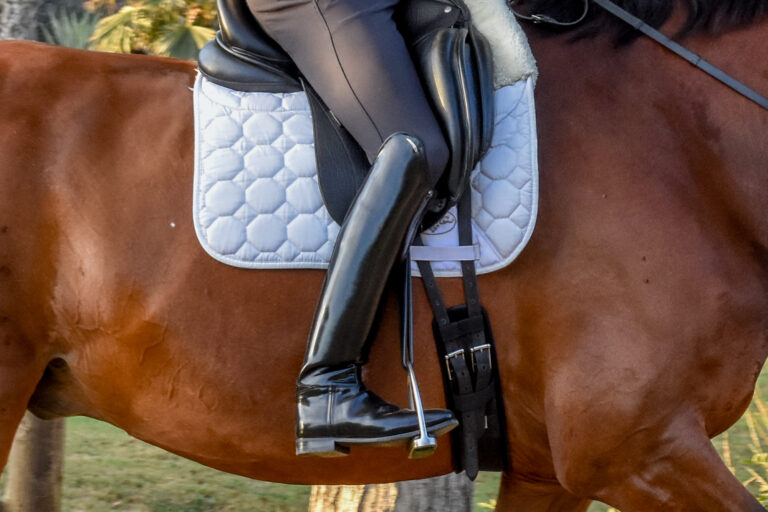You know that feeling you get when you watch a really good rider on a really beautiful horse? Let’s say it’s Charlotte Dujardin on Valegro (shown below), and you have the feeling that the horse and rider are doing the movements effortlessly, without a care? Now, I bet you also know that feeling of trying to accomplish something with your own horse, but instead, you end up feeling utterly and completely incompetent.
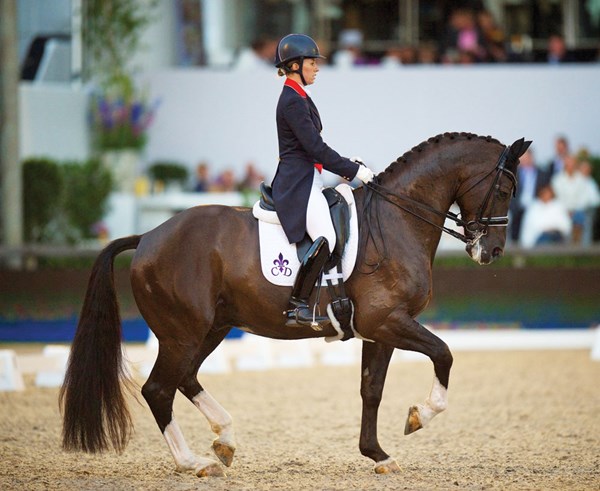
Dressage is incredibly hard, and in the beginning, it’s difficult to really understand what it is you’re supposed to be doing in the first place. Beyond that, it’s even harder to get your brain to make your body do what it is that you want, even once you know what that is. The added difficulty of our sport is that then we have to make the horse, another species, also understand what to do and then we must get his body to do it, too. Phew, it sounds exhausting just writing about it—and maybe even a little depressing.
There’s good news, though. Absolutely everyone (even Charlotte Dujardin, I’m betting) knows that same feeling of incompetence and they have had to deal with that over and over again throughout their learning process. If we, as riders, can learn to embrace those moments as a very important part of our learning curve, we can move past them more quickly to faster approach those feelings of competence and then maybe one day, even that feeling of effortlessness.
To make progress through this learning process, it is helpful to understand a model called “The Four Stages of Competence” and it applies to learning any skill in the world.
This idea was developed by Noel Burch, who was working for well-known psychologist Dr. Thomas Gordon in the 1970s. The stages are:
• Unconscious Incompetence
• Conscious Incompetence
• Conscious Competence
• Unconscious Competence
Everyone, and I mean everyone, must go through these four stages to learn any skill in the world—piano, reading, soccer, woodworking, skydiving, arithmetic and, yes, dressage. In this article, I mostly want to focus on the first two stages: Unconscious Incompetence and Conscious Incompetence.
I know those both sound pretty depressing, but they are hugely important, and we can’t move into the competence stages without them. As a teacher, I see a lot of people trying desperately to skip one or both of these stages, and although that desire is understandable, it makes learning harder and longer in the end.
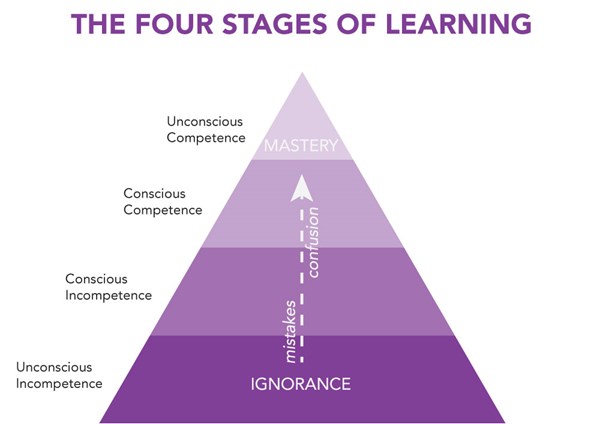
First Stage: Unconscious Incompetence
This stage basically means you don’t know what you don’t know. Let’s take the concept of riding a horse on the bit in a round frame. Think back to when you first started riding, maybe when you took some basic hunt seat or Western lessons. No one ever talked to you about riding a horse “round” and “into a connection,” and you probably never even thought about it. You held the reins, used them for steering and stopping, tried to be careful with your hands and that was that.
Once you started progressing in dressage, at some point you became aware of this concept of riding a horse on the bit. You probably first noticed that most dressage horses look different in the way they carry their heads and necks.
And then you hopefully had a teacher who began to explain to you how this concept works, both for the horse biomechanically, and how you, as the rider, can help make it happen.
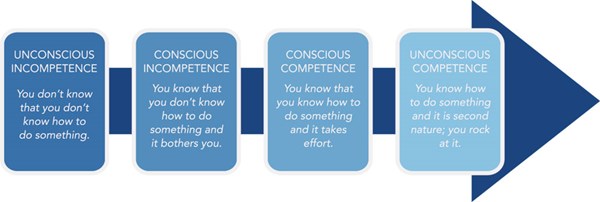
Second Stage: Conscious Incompetence
This Conscious Incompetence stage means that you know what it is you want to do, but you still are unable to do it. This is the most frustrating stage for anyone in learning. So now you know that a horse can go round and a rider can ride a horse on the bit. But then you’re left with the question: how in the hell do you actually ride a horse on the bit? This is where every rider in the world needs to do two things: find a good trainer and be a good student.
Finding a good trainer seems pretty obvious, but it isn’t always easy. You need someone to explain the concept to you, showyou how to do it (over and over and over again) and hopefully put you in situations where you feelthe right thing (over and over and over again), even if only for brief moments.
No matter what kind of learner you are (visual, kinesthetic, verbal, etc.), it won’t work to learn a concept from only one method. Reading about riding a horse on the bit can be great, but reading alone will not make you competent. Watching good riders is important, but no matter how much you watch someone ride a horse round into a steady, soft connection, it will not make you competent. Riding a horse who knows how to go round easily is incredibly helpful, but, unfortunately, that will not always transfer to competence in riding your own horse round.
This is where being a good student comes in. You have to employ all of the mentioned techniques, but, most importantly, seek out the advice of a good trainer who will help you. You have to be honest, both with yourself and with the trainer, about how littleyou know. This isn’t meant to be demeaning. Really ask yourself: Do I understand the concept? Then: Do I understand the steps of how to go about doing it? A good trainer should go over these questions with you in detail, without assuming you know the answers. As a good student, you should ask lots of questions without assumption either. And then comes the hard work of trying and failing and trying again and again and again.
The Pitfalls
I know it would be much more fun to now go on to the stage of Conscious Competence, where you finally start to get it, even though you have to think really hard about it. But I want to sit with these first two stages a little more. Why do some people resist them so much?
For starters, it’s often embarrassing to learn that you didn’t know something and really frustrating to not be able to do it well. But if you allow either of those emotions—embarrassment or frustration—to keep you from being a good student, you will slow down your progress. Another common term for this feeling is to be “outside your comfort zone.” When many people reach this point, they often retreat back into the safety bubble of their comfort zone.
I feel that dressage, especially, lends itself to people pretending they know things that they don’t. The vocabulary we use in dressage is so specialized that it is very easy to get lost as a beginner. Say you’re at a show and the judge says, “You need to drive your horse more into the outside rein so that he engages the inside hind leg and comes more uphill with better self-carriage.” I know you are really thinking, “Come again? Was that English?” But instead, you just say, “Oh. OK.”
You should never feel embarrassed about not knowing something, no matter how long you’ve been riding. If you ask an honest question, a good trainer will never say, “I can’t believe you don’t know this!” If your trainer makes you feel stupid or embarrassed for not knowing something, you need to find a new trainer. Now.
Often, we think we want to work on some skill—like riding our horse round—but we find out that some prerequisites to accomplishing that skill are missing—like having a balanced enough seat to be able to ask our horse to go on the bit. When you and your trainer start breaking down what is needed to accomplish something, you will probably have to go back a few steps to discover that you need to improve other, easier skills that you thought you had down. If you resist this temporary regression, you’re not holding up your end of the deal of being a good student.
This is another pitfall to which dressage riders are especially prone. As a trainer, I have had a new student arrive who wants to work on a specific movement—let’s say it is the half pass. But I find that her basic position is not good enough yet, and I want to be a good teacher and try to work with her on improving her seat so that she can have a better connection over the horse’s back, which will eventually improve everything, including the half passes. But if the student says, “Look, I don’t want to talk about how I sit, I wanted your help with half passes,” that rider will slow down her progress or maybe never get to where she wants to go.
Embrace It
So, you know deep down inside that you don’t completely understand something, and you definitely know that you’re not super good at it yet. The best students and those who progress the quickest embrace these feelings and take them on as a positive challenge. They don’t try to make others think they know things or cover up their incompetence by riding alone or avoiding the issue.
When I have that oh-so-familiar feeling of incompetence, I try to make myself think: Yes! This is the first step to learning this skill inside and out. Now, maybe I don’t completely feel that way, but I try to say it to myself as a reminder. The next question I ask myself is: Do I truly understand what it is I’m trying to do? And then, How do I do it? I’m going to need the help of a good trainer. I’m going to need to watch good riders do what it is I want to do and I’m going to need to try it over and over and over while I continue to ask questions.
The best way to deal with that awful clutsy feeling of incompetence is to laugh. And then experiment. Chuckle at your lack of coordination and then start to ask questions and experiment until you get it—just for a second—and then try to get it again.
The joy of this sport (and the horror) is that you will run into these four stages again and again as you progress. Every time you get to the next level there will be new concepts to learn and new skills to perfect.
Every time you get on a new horse, you will find there are things you didn’t know and something that doesn’t work with this horse the way it did with the last one. You get to decide if this is exciting or depressing. And the way you approach these learning challenges will definitely affect the outcome.
Allow yourself to go through each stage—Unconscious Incompetence is where you admit to yourself and your trainer that you don’t know something. Conscious Incompetence is the time for you to sit with the fact that while you understand the concept, you still can’t quite do it yet. And from there you and your trainer can break down the ways in which you willbecome competent.
Conscious Competence will eventually come, and you’ll finally feel able to do what it is that you wanted, but you’ll have to think about it every step of the way. If you continue to be a good student by asking questions, experimenting and pushing yourself a little outside your comfort zone, then you’ll finally reach the stage of Unconscious Competence.
This is the feeling of effortlessness that you get when watching Charlotte and Valegro. You will no longer have to think so hard about howto do it, and it will come much more naturally and immediately. And then, if you have a good trainer, she’ll say, “Congratulations! You’ve gotten so good at that. Now, we’re going to move on to this next skill.” And it will start all over again.
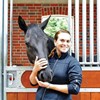
Eliza Sydnor Romm works as a dressage trainer and instructor at Braeburn Farm in Snow Camp, North Carolina. She is a USDF Certified Instructor through Fourth Level and is an active competitor from Training Level through Grand Prix. She specializes in working with young horses. She and her husband, Jonathan, live in Chapel Hill, North Carolina, and have one son, Daniel. (elizasydnordressage.com)


